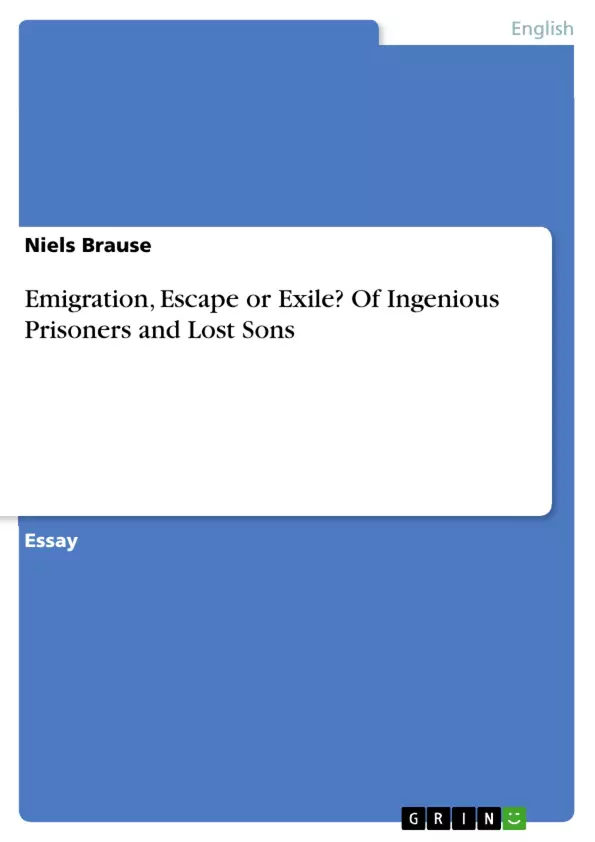Since the Great Famine emigration has been a common choice in Ireland and therefore a major aspect of Irish life and literature, too - but how is this emigration portrayed in literary periods like the Irish Literary Revival? In answering this question this text will focus on the texts of two authors associated with the Irish Literary Revival, George Moore's Home Sickness and James Joyce's Little Cloud. In both stories an emigrant returns to “good old Ireland” and cannot avoid comparing it with the world he discovered beyond the emerald Island. In this way the reader gains insights into the motivations behind emigration and the emotions that are associated with it.
Inhaltsverzeichnis (Table of Contents)
- Emigration, Escape or Exile? - Of Ingenious Prisoners and Lost Sons
- Home Sickness - James Bryden and His “Inverse Emigration”
- Little Cloud - Ignatius Gallaher and the “Trammels of Dublin”
- Ireland as a Prison
Zielsetzung und Themenschwerpunkte (Objectives and Key Themes)
This text explores the portrayal of emigration in Irish literature, specifically during the Irish Literary Revival, through the lens of two short stories: George Moore's "Home Sickness" and James Joyce's "Little Cloud." By examining the experiences of returning emigrants, the text aims to shed light on the motivations behind emigration and the emotions associated with it. It analyzes the characters' perceptions of Ireland and their struggle to reconcile their Irish identity with their experiences abroad.
- The complexities of Irish emigration and its portrayal in literature
- The impact of emigration on individual identity and personal development
- The role of Ireland as a place of both nostalgia and confinement
- The contrasting perspectives on emigration presented by the two stories
- The themes of escape, exile, and imprisonment in relation to Irish identity
Zusammenfassung der Kapitel (Chapter Summaries)
- In "Home Sickness," the protagonist, James Bryden, returns to Ireland after a period of living in America. Initially drawn to the idea of reconnecting with his roots, Bryden gradually becomes disillusioned with the limitations and perceived stagnation of Irish life. He finds himself unable to relate to the villagers and ultimately chooses to escape back to America, leaving behind his fiancé. Bryden's journey highlights the emotional complexities of returning to a place that no longer feels like home.
- "Little Cloud" features Ignatius Gallaher, a successful emigrant who has found success in London. His encounter with the protagonist, Little Chandler, emphasizes the allure of escape from the perceived limitations of Dublin. While Gallaher expresses a nostalgic fondness for Ireland, he ultimately views it as a place that stifles ambition and personal growth. His experiences highlight the idea of Ireland as a prison for the "ingenious."
Schlüsselwörter (Keywords)
The text delves into the thematic interplay between emigration, identity, and the portrayal of Ireland in literature. Key concepts include the "inverse emigration" of returning emigrants, the "trammels of Dublin," the notion of Ireland as a prison for ambitious individuals, and the emotional complexities of reconciling one's Irish identity with experiences abroad. The analysis focuses on the short stories "Home Sickness" by George Moore and "Little Cloud" by James Joyce, which exemplify the contrasting experiences of emigrants returning to Ireland during the Irish Literary Revival.
Frequently Asked Questions
How is Irish emigration portrayed in the Irish Literary Revival?
Emigration is often depicted as a struggle between the nostalgia for "good old Ireland" and the reality of a country perceived as a stagnant prison by those who return.
What is George Moore's "Home Sickness" about?
It tells the story of James Bryden, who returns to Ireland from America but eventually finds himself unable to adapt to the limitations of village life, leading him to escape back to America.
How does James Joyce portray Dublin in "A Little Cloud"?
Joyce portrays Dublin through the "trammels of Dublin," suggesting that the city acts as a prison that stifles the ambition and personal growth of its inhabitants.
What is "inverse emigration"?
It refers to the experience of emigrants returning to their home country, only to realize that their identity has changed and they no longer fit into their original society.
What are the common emotions associated with emigration in these stories?
Characters often experience a complex mix of nostalgia, disillusionment, feelings of confinement, and the urge to escape.
- Quote paper
- Niels Brause (Author), 2012, Emigration, Escape or Exile? Of Ingenious Prisoners and Lost Sons, Munich, GRIN Verlag, https://www.grin.com/document/355559



